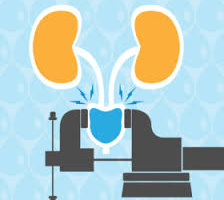Stress Incontinence in Males

Stress Incontinence in males is a condition of unintentional loss of urine. It is not a disease, but rather a symptom of another condition. leading to loss of bladder control.
Types:
Stress Incontinence – Involuntary loss of urine during actions such as coughing, sneezing and lifting that put abdominal pressure on bladder.
Urge Incontinence – Involuntary loss of urine following an over helming urge to urinate that cannot e halted.
Overflow Incontinence – Constant dribbling of urine leading to increase in the frequency of small amounts of urine.
Functional Incontinence – Impairment (Physical or Mental) leads to functional incontinence.
Transient Incontinence –It is often result of short term conditions such as UTI. It may also occur due to side effects of medications /other medical conditions.
Mixed Incontinence – Incontinence that falls into a two or more of above categories.
Causes:
- Chronic Cough
- Constipation
- Obesity
- Urinary tract Infections
- Obstruction in Urinary tract infections
- Loss of Sphincter Strength
- Diabetes for many years
- Overactive bladder
- Heart and BP Medications,
- Sedatives and relaxants
- Caffeine
- Alcohol
- Stroke and other neurological conditions
Complications:
- Skin Problems – Rashes , Infections and Sores
- Urinary tract Infections
- Impacts on personal life
Diagnosis:
- Urine analysis
- Bladder diary
- Post void residual measurement
- Urodynamic testing
- Pelvic ultrasonography
- Digital rectal exam
- Physical examination
- EEG and EMG
Prevention:
- Maintain healthy weight
- Practise Pelvic floor Exercises
- Avoid bladder irritants –Caffeine , alcohol , acidic foods
- Eat more fibre content food which prevents constipation and avoid
- urinary incontinence
- Avoid Smoking
Management:
- Medical
- Interventional therapy
- Physical therapy
- Surgical
- Medical treatment –
- Alpha blockers
- Anticholinergics
- Antispasmodics
- Interventional therapy –
- Bulking material injection
- Botulinum toxin type-A
- Nerve Stimulators
Physical Therapy:
Behaviour therapy :-
- Bladder training
- Double voiding and other progressive exercises
- Modalities:
- Heat
- Cold
- EMG Biofeedback
- Electrical stimulation
- Dry needling
- Ultrasound
- Manual physiotherapy procedures
- Soft tissue mobilization
- Pelvic floor strengthening exercises
- Kegel’s Exercises
- Manual and few other facilitative exercises
Surgical Treatment:
- Artificial urinary sphincter (AVS) balloon
- Sling procedure
- Catheter
- Urinary collection system
- Underwear guards
- Urinary diversion
- Prolapse surgery
For more details contact
us on 📞9618906780
